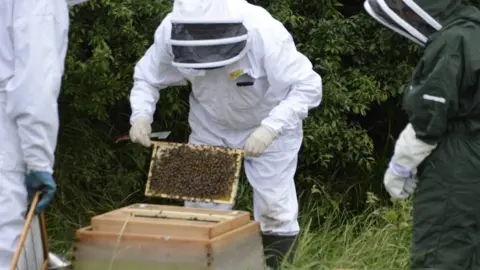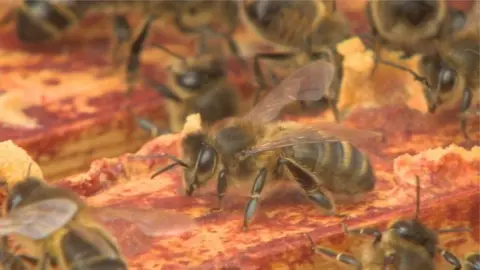Black honey bees are to be introduced at Abberton Reservoir
 Essex & Suffolk Water
Essex & Suffolk WaterA species of bee once believed to be extinct in Britain is to be introduced to a nature reserve to help boost numbers.
Three hives at Abberton Reservoir, in Essex, will initially be populated with black queen honey bees.
It is hoped they will breed to help establish more colonies in the area.
The site was chosen because it is far enough away from other hives to prevent inter-breeding and ensure the "purity" of the bees.
The project is a partnership between Essex and Suffolk Water, the Essex Wildlife Trust and the Bee Improvement and Bee Breeders Association (BIBBA).
Chairman of BIBBA, Nick Bentham-Green, said it was a "significant step in the right direction" for the conservation of the bees.
"Honeybees face an uphill struggle for survival, most notably from the thousands of bees that are imported every year and with them pests and diseases," he said.

Black honey bees

- The black honey bee, also known as Apis mellifera mellifera, is a native species to the UK but was thought to have been wiped out by the early 20th century
- It flies at lower temperatures than non-native bees, which makes them more successful at finding food and mating
- There are about 28 different sub-species of the western honey bee
- Other names for the black been include "Old English", "Irish Black" and "Brown Bee"
Source: BIBBA

Numbers of bees in the UK have been hit by a reduction in their natural habitat, the Bumblebee Conservation Trust said.
Jo Wray, of Essex Wildlife Trust, said they were looking forward to getting offspring from the queen bees.
"Our nature reserve is covered in wildflowers, providing ample opportunity and habitat for the black bees to forage and collect pollen," she said.
Conservation advisor for Essex and Suffolk Water, Helen Jacobs, said local beekeepers will be encouraged to use the black bees, bringing benefits for local agriculture and wildlife which relies on honey bee pollination.
